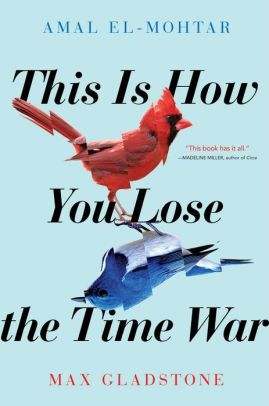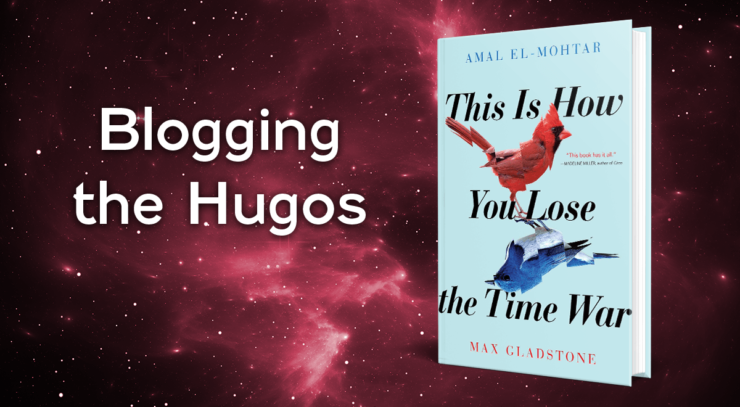In the lead-up to the 2020 Hugo Awards, we’re taking time to appreciate this year’s best novella Finalists, and what makes each of them great.
Letters are romantic. They’re personal promises, sent out on hope, and when they land in an inbox, a mailbox, a cubby, they’re proof of consideration, and time, and love. Even if it’s not a letter to a lover, but just to a friend, a neighbor, or your family, the art of letter writing has never lost its charm, despite what junk mail has done to our sense of a mailbox.
This is How You Lose the Time War is one extended, synthetic, fantastic love letter to genre.
It’s frantic and impulsive, and while each short (short, very short) chapter spends just enough time describing where you are to ground you in the energy of that single spectacular moment, the entire novella is focused on twisting parts of history into a clever little clover-stemmed crown. Blending science fiction and fantasy with each of the two women who occupy its pages, the main characters send each other mail encoded in tea blends, in chimes, in lava and smoke. There is care and craft and secrecy; a promise of another letter, a promise of a continuation. A dear heart, a love-lorn, a lost word dropped from a sentence that makes you pause and parse through every other piece of flimsy to fill in the winsome blank.
The book starts with two women, Red and Blue, on opposite factions—the Agency and the Garden, respectively, fighting to gain control of various aspects of the timeline in order to create the future that allows their faction to take over. A plot that’s less focused on the events within it and more concerned with how we get there in the first/second/fifth/tenth place, the book takes you through a tapestry of worlds and decisions, the intrigue of massive hive-minds that may or may not be independent seedlings all mired in the same mud.
Buy the Book


This Is How You Lose The Time War
Time War explores the varieties of humankind, the times when we failed and faltered, when Ghengis Khan conquered, when Atlantis sunk into the sea, when the planet failed to turn back an alien attack. It praises the mundanity of eating a pleasant meal and caring for a topiary. This is How You Lose the Time War takes its time in each small piece of the world, but it never loses itself. This short novella, like time, like a cat with a thread pulling on a new couch, unravels itself very quickly.
Fast-paced, unmoored, Time War is a ship in a hurricane. As each moment passes there is something entirely new, delightful, and terrifying. The whip-crack prose, no doubt multiplied under the dual pens of Amal El-Mohtar and Max Gladstone, creates diamonds out of sea salt and asks you to read prophesy in the wreckage. As the lesser Charybdis of time sucks you in and spits you out, this novella, that is both leviathan and haggard sailor, is pursued at every moment by the unknowable and the familiar. And while every second is sharp and soaking in its own prose it is not ever weighed down, but it sticks to you like wet clothing. Time War is a ship in the doldrums, surrounded by sharks.
As each character’s motivations become honed against the edge of the other, they find themselves entangled not only in time and space and roots and circuits but in the ruins of each other. They fall in love, without question, without promises, with only letters connecting them. A relationship built on shared interests, on new-found ones, on exploring and experimenting and sharing meals together, even while apart. It seems a strange moment (in our time, in the strange now) to read about characters who cannot see each other except in symbols and across screens, but who care so deeply because of the letters they have written. It speaks to our personal desires for connection, no matter the cost.
Aren’t text messages letters? Emails? Is a protest sign a love letter?
Time War is a book that has a universe of universes attached to it. It is a book that is expansive, that grows with every chapter, and never challenges itself to restraint. It’s a book that thrives on invention, expansion, and chaos. The entire point of the novella is entropy, the neverending misfortune of the universe to be turbulent. As time trips over itself, the book catches you on cliff’s edges. It drags the reader down the slope, and hooks you at the last moment, at the send-off, at sin cera.
This novella is beautiful. It allows the setting to get out of hand, but the characters and story are always tightly bound together, always circling each other. There are shadows that darken, mysteries that deepen, and at the end of the story, the time war doesn’t end, but starts again, a cycle of impossible devotion, a love that never dies. Despite the expanse that Time War covers, the book is careful and measured, and never gives too much of itself away at any time. It is marvelously paced, frantic and delightful, and takes pleasure in keeping the reader in the dark. We read from the margins, watching as the colors blend, as time’s warp and woof are threaded tighter and tighter until the center of the story, the love itself, the women, warriors, plants, computers, all parts of enemies and lovers, come full circle. This is How You Lose the Time War is a hope-filled, bright-eyed, Escherine love-knot that packages itself neatly into one deceptively small switchblade novella.
To you, with love.
Linda H. Codega is an avid reader, writer, and fan. They specialize in media critique and fandom and they are also a short story author and game designer. Inspired by magical realism, comic books, the silver screen, and social activism, their writing reflects an innate curiosity and a deep caring and investment in media, fandom, and the intersection of social justice and pop culture. Find them on twitter @_linfinn.










